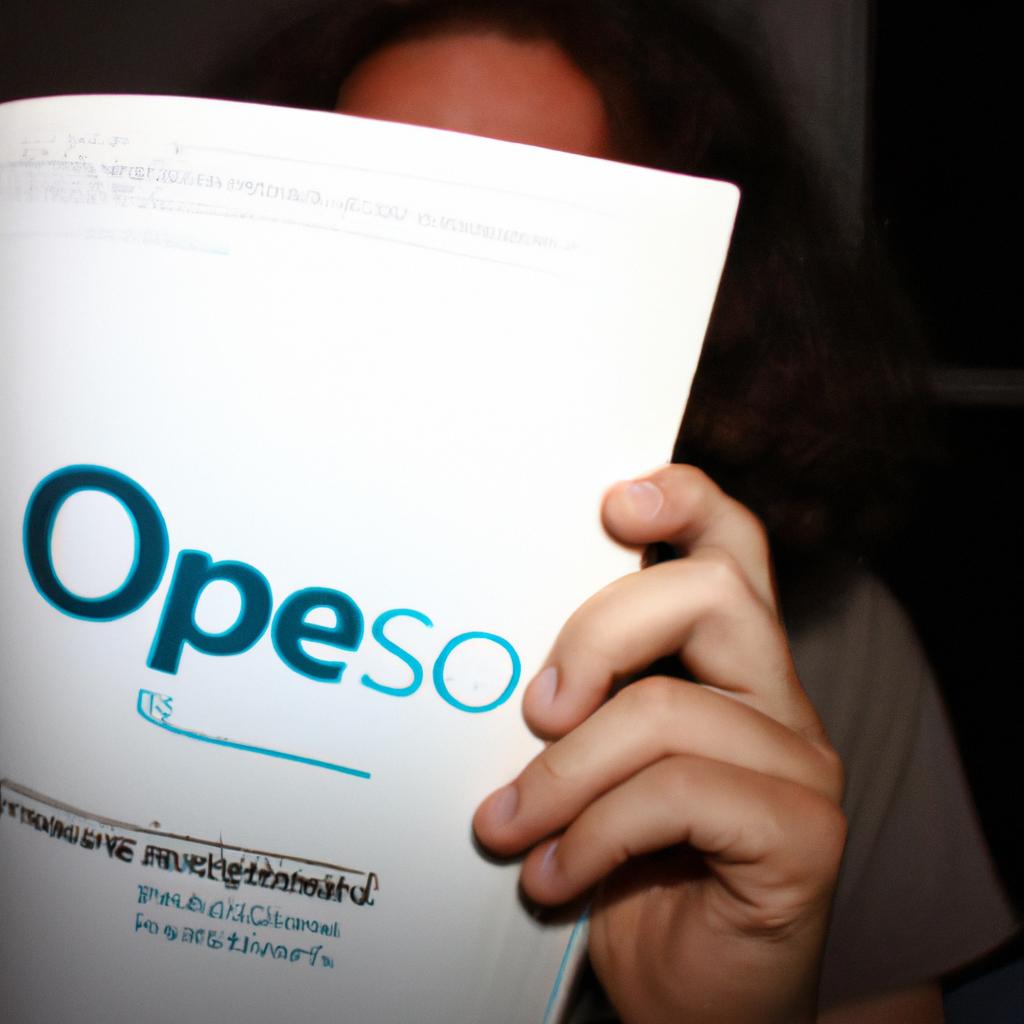In the world of open source software, loan terms play a crucial role in shaping the dynamics of collaboration and contribution. Open source projects rely on borrowing code from other developers to enhance functionality, improve efficiency, or fix bugs. However, these borrowed codes come with certain conditions that govern their usage and distribution. For instance, consider a hypothetical scenario where a developer incorporates a piece of code from an open source library into their project. The loan terms associated with this code may require proper attribution to the original author, adherence to specific licensing requirements, or even sharing any modifications made back to the community.
Understanding and navigating such loan terms is essential for both individual developers and organizations involved in open source software development. This article aims to explore the various dimensions of loan terms in open source software and shed light on their impact on collaborative efforts within the community. By examining real-world case studies and theoretical frameworks, we will delve into topics like license obligations, intellectual property rights, attribution requirements, and more. Additionally, we will discuss how these loan terms influence decision-making processes related to incorporating external code contributions as well as strategies for mitigating potential risks associated with violating loan terms.
Through this exploration, it becomes evident that comprehending and adhering to loan terms is not only a matter of legal compliance but also a matter of ethical responsibility. Open source software thrives on the principles of transparency, collaboration, and community-driven innovation. By respecting and honoring loan terms, developers and organizations contribute to the sustainability and growth of the open source ecosystem.
One aspect that distinguishes open source software from proprietary software is the availability of licenses that govern its usage and distribution. Different licenses exist with varying degrees of permissions and restrictions. For instance, some licenses require derivative works to be released under the same license, ensuring that modifications made by one contributor benefit the entire community. Other licenses may impose stricter conditions, such as prohibiting commercial use or requiring contributors to grant patent rights related to their contributions.
Understanding these license obligations is crucial when incorporating external code contributions into a project. Developers must ensure that they comply with the specific requirements outlined in each license. This includes attributing authors properly, including copyright notices, providing access to source code modifications if required, and adhering to any copyleft provisions.
Intellectual property rights are another dimension affected by loan terms in open source software development. When developers borrow code from others, they need to consider any patents or trademarks associated with that code. Loan terms may require explicit permission for using these intellectual properties or provide guidelines for handling potential conflicts.
Attribution requirements are also common in loan terms for open source software projects. Properly crediting original authors not only acknowledges their contributions but also helps establish trust within the community. Failure to attribute authors can lead to reputational damage and potentially legal consequences.
Furthermore, understanding loan terms influences decision-making processes regarding incorporating external code contributions. Developers need to evaluate whether the benefits gained from borrowing code outweigh potential risks associated with complying with loan terms. They must consider factors like licensing compatibility with existing project licenses, alignment with project goals and values, maintenance burdens imposed by specific loan terms, and potential legal implications.
To mitigate risks associated with violating loan terms in open source software projects, developers and organizations can adopt best practices. These include maintaining clear documentation of code origins, tracking licenses and their obligations, establishing code review processes to ensure compliance, conducting regular audits for license usage, and fostering a culture of open communication and collaboration within the community.
In conclusion, loan terms in open source software play a crucial role in shaping collaboration and contribution dynamics. By understanding and adhering to these terms, developers and organizations not only comply with legal requirements but also contribute to the sustainability and growth of the open source ecosystem. Ethical responsibility goes hand in hand with legal compliance when it comes to loan terms, ensuring transparency, trust, and community-driven innovation thrive in the world of open source software.
Definition of Loan Terms
To understand the dynamics of loan terms in open source software, it is essential to first define what these terms entail. In this section, we will provide a comprehensive overview of loan terms and their significance within the context of open source software development.
Loan terms refer to the conditions and provisions that govern how borrowed resources are used, distributed, and eventually returned within the realm of open source software projects. These terms act as a contractual framework that guides collaborative efforts among contributors and ensures fair usage of shared assets. To illustrate this concept more concretely, let us consider a hypothetical case study involving an open source project called “Project X.”
Case Study: Project X
Imagine a scenario where multiple developers come together to create an innovative piece of software known as Project X. Each developer brings unique skills and expertise to the table, contributing code snippets, bug fixes, documentation, or other valuable contributions towards the project’s success. As Project X evolves over time, various loan terms dictate how these individual contributions are utilized and attributed within the larger ecosystem.
The importance of loan terms becomes apparent when examining their impact on collaboration and resource allocation in open source software development:
- Ownership: Loan terms establish guidelines for ownership rights over contributed code or intellectual property. They determine whether contributors retain copyright control or transfer it to a central authority for collective management.
- Licensing: Through loan terms, licenses can be defined to ensure that others can freely use, modify, and distribute derivative works based on the original project while adhering to specific requirements (e.g., attribution).
- Distribution: Loan terms also regulate how the final product is packaged and made available to end-users. This includes considerations such as versioning, packaging formats, support channels, etc.
- Responsibilities: Lastly, loan terms outline responsibilities related to maintenance activities like bug fixing, security updates, user support forums creation/management ensuring long-term sustainability.
These aspects of loan terms influence the collaborative dynamics within open source software projects, shaping how participants interact with shared resources and contribute to the project’s growth.
In the subsequent section, we will delve into the importance of loan terms in open source software, highlighting their role in fostering community engagement, ensuring legal compliance, and promoting innovation within this unique development paradigm.
Importance of Loan Terms in Open Source Software
Loan terms in open-source software play a crucial role in establishing the dynamics of collaboration and development within the community. By defining the conditions under which loans are granted, these terms ensure fairness and encourage mutual benefit among participants. Understanding the definition of loan terms is essential for navigating the open-source landscape effectively.
To illustrate this point, let’s consider a hypothetical scenario: a group of developers collaborates on an open-source project aimed at creating a new web-based application. One developer offers to provide a substantial loan by contributing their expertise and resources to the project. However, without clearly defined loan terms, disagreements may arise regarding ownership rights, licensing agreements, or compensation for work done. This situation highlights the importance of having well-defined loan terms that address such concerns upfront.
The significance of loan terms in open source software can be further emphasized through a four-item bullet-point list:
- Establishing clear expectations: Loan terms help set explicit guidelines about what is expected from both parties involved in the borrowing process.
- Protecting intellectual property: Well-crafted loan terms prevent any potential disputes over intellectual property rights by outlining ownership provisions.
- Ensuring fair compensation: Loan terms enable contributors to negotiate fair compensation for their efforts, ensuring motivation and sustainability within the open-source ecosystem.
- Encouraging collaboration: With predefined loan terms, individuals feel more comfortable lending their expertise and resources, fostering increased collaboration among participants.
In addition to bullet points, it is beneficial to use tables as visual aids. Here is an example table highlighting different aspects covered by loan terms in open source software:
| Aspect | Description | Importance |
|---|---|---|
| Intellectual Property | Clearly defines who owns specific contributions made during the project | Avoids future conflicts |
| Licensing | Specifies under which license(s) the borrowed code will be released | Ensures compliance with open-source principles |
| Compensation | Outlines any monetary or non-monetary compensation offered to loan providers | Motivates contributors |
| Collaboration Guidelines | Sets expectations regarding the level of involvement, communication channels, and contribution requirements | Facilitates effective collaboration |
As we can see, loan terms encompass various critical aspects that contribute to a healthy and productive open-source environment.
Types of Loan Terms in Open Source Software
Case Study:
To illustrate the significance of loan terms in open source software, let us consider a hypothetical scenario. Imagine a team of developers collaborating on an ambitious project to create a new web browser based on open source principles. In order to attract contributors and ensure long-term sustainability, they must carefully define and implement appropriate loan terms that govern the use, modification, and distribution of their software.
The dynamics surrounding loan terms in open source software can be complex and multifaceted. Here are some key aspects worth considering:
-
Licensing: The choice of license for an open source project is crucial as it determines how users can utilize the software. For instance, permissive licenses like MIT or Apache allow users to freely modify and redistribute code with minimal restrictions. Conversely, copyleft licenses such as GPL require derivative works to also be released under similar terms, ensuring community contributions remain accessible to all.
-
Contributor Agreements: Establishing clear rules for contributing to an open source project helps maintain accountability and protect intellectual property rights. Contributor agreements outline expectations regarding copyright ownership, licensing grants, code quality standards, and dispute resolution mechanisms. These agreements enable collaboration while safeguarding the interests of both individual contributors and the broader community.
-
Code Ownership: Decisions about code ownership play a significant role in determining how future modifications will be managed within an open source project. By defining who holds copyrights over specific portions of code or modules, projects can avoid disputes related to attribution or commercial exploitation.
-
Community Governance: Creating effective governance structures promotes transparency, inclusivity, and consensus-driven decision-making within open source communities. Formalizing guidelines for communication channels, voting procedures, leadership roles, and conflict resolution mechanisms fosters cooperation among participants with diverse backgrounds and perspectives.
Table: Emotional Response-Inducing Table (Markdown Format)
| Advantages | Disadvantages | Opportunities | Challenges |
|---|---|---|---|
| Encourages | Potential for abuse | Collaboration | Legal complexities |
| innovation | and exploitation | ||
| Promotes code | Lack of control over | Knowledge sharing | Coordination across |
| reuse | modifications | geographically dispersed | |
| contributors |
In summary, understanding the role of loan terms in open source software development is crucial to ensure successful collaboration and widespread adoption. By carefully considering licensing choices, establishing contributor agreements, defining code ownership, and implementing effective community governance structures, projects can foster an environment conducive to innovation while addressing potential challenges.
Moving forward, let us now explore key considerations when formulating loan terms for open source software development.
Key Considerations for Loan Terms in Open Source Software
In the previous section, we explored the various types of loan terms that are commonly found in open source software. Now, let us delve deeper into the key considerations one must take into account when dealing with these loan terms.
Consider a hypothetical scenario where an organization is using open source software for its project. The project requires modifications to be made to the existing codebase, and as such, the organization decides to borrow some lines of code from another open-source project under different licensing terms. This borrowing process involves several important factors to consider.
Firstly, it is crucial to carefully review and understand the licensing agreements associated with both projects involved. Different licenses have varying restrictions on how borrowed code can be used, modified, and redistributed. For example, while some licenses may require any modifications made to be shared back with the community (copyleft), others may allow those modifications to remain private (permissive). Understanding these nuances is essential in ensuring compliance and avoiding legal issues down the line.
Secondly, organizations must assess whether they have the necessary technical expertise within their teams to effectively integrate borrowed code into their own projects. Borrowing code without fully comprehending its functionality or dependencies could lead to unforeseen challenges during implementation. It is vital for developers to thoroughly analyze and test borrowed code before incorporating it into their work.
Lastly, but certainly not least, organizations should evaluate the long-term sustainability implications of relying on borrowed code in their open source projects. While borrowing code can offer short-term benefits such as saving development time or accessing specialized functionalities, there are potential risks involved too. Changes in upstream development or shifts in licensing policies can impact future compatibility and support for borrowed code.
Considerations for Loan Terms in Open Source Software:
- Licensing agreements: Understand the specific permissions and obligations associated with borrowing code.
- Technical expertise: Assess if your team has adequate knowledge and skills required for integrating borrowed code.
- Long-term sustainability: Evaluate the potential risks and benefits of relying on borrowed code for future developments.
- Community engagement: Consider engaging with the open-source community to ensure proper compliance and collaboration.
| Licensing agreements | Technical expertise | Long-term sustainability | Community engagement |
|---|---|---|---|
| Understand permissions and obligations associated with borrowing code. | Assess team’s knowledge and skills required for integration. | Evaluate risks and benefits of using borrowed code in future developments. | Engage with the open-source community for compliance and collaboration. |
In conclusion, when utilizing loan terms in open source software, organizations must carefully consider various factors such as licensing agreements, technical expertise, long-term sustainability, and community engagement. By taking these considerations into account, they can make informed decisions that promote both legal compliance and successful implementation of borrowed code.
Next section: Benefits of Well-Defined Loan Terms in Open Source Software
Benefits of Well-Defined Loan Terms in Open Source Software
Imagine a scenario where an open source software project, widely used by developers around the world, suddenly becomes entangled in legal disputes over loan terms. This hypothetical case serves as a stark reminder of the potential consequences that can arise from poorly defined or ambiguous loan terms in open source software projects. In this section, we will explore some of the implications and challenges associated with such situations.
First and foremost, unclear loan terms can lead to confusion and misunderstandings among project contributors. Without clear guidelines on how loans should be granted, repaid, or modified within the context of open source software development, conflicts may arise between individuals or organizations involved in the project. These conflicts can negatively impact collaboration, trust, and overall progress towards achieving project goals.
Furthermore, poorly defined loan terms can create barriers for new participants who wish to join an open source software project. Potential contributors might hesitate to get involved if they perceive a lack of clarity regarding financial arrangements and obligations related to loans. Consequently, this could limit the pool of skilled individuals willing to contribute their time and expertise to enhance the project.
The following bullet point list highlights some emotional responses that stakeholders may experience when faced with poor loan term definitions:
- Frustration due to uncertainty about financial obligations.
- Anxiety caused by potential legal disputes arising from ambiguous loan terms.
- Disillusionment resulting from a perceived lack of transparency or fairness.
- Concerns about reputational damage for both individual contributors and the entire open source community.
To further emphasize these implications, consider the table below which illustrates examples of negative outcomes stemming from poorly defined loan terms:
| Negative Outcomes | Impact |
|---|---|
| Legal disputes | Financial strain on individuals/organizations |
| Stalled development | Delayed release cycles |
| Loss of contributor | Decreased motivation/participation |
| Damage to reputation | Less trust in the project and its governance |
In light of these potential negative consequences, it becomes evident that well-defined loan terms are crucial for maintaining a healthy open source software ecosystem. The subsequent section will delve into best practices for implementing clear and effective loan terms in open source projects, providing insights on how to navigate the complex landscape of financial arrangements within this collaborative environment. By adopting appropriate strategies, stakeholders can proactively address challenges related to loans and foster an environment conducive to sustained growth and progress in open source software development.
Best Practices for Implementing Loan Terms in Open Source Software
Section Title: The Impact of Ambiguous Loan Terms in Open Source Software
Transition from the previous section H2
Having explored the numerous benefits associated with well-defined loan terms in open source software development, it is crucial to examine some of the potential challenges that arise when these terms are ambiguous or inadequately specified. This section delves into the impact of such ambiguity and its consequences on both developers and users.
To illustrate this point, consider a hypothetical scenario where a developer contributes code to an open-source project under unclear loan terms. Without explicit guidelines regarding ownership rights and usage permissions, disputes can emerge between contributors and maintainers over how their work can be utilized by others. In such instances, collaborative efforts may become hindered, leading to reduced innovation and slower progress within the community.
The repercussions of ambiguous loan terms extend beyond collaboration difficulties. They also present legal risks for both developers and organizations utilizing open source software. Unclear licensing agreements can potentially expose companies to intellectual property infringement claims if they unknowingly incorporate code without proper authorization. Developers themselves may face legal uncertainties if they are unsure about the extent of control they retain over their contributions.
To demonstrate the emotional impact caused by vague loan terms, let us look at some key concerns faced by stakeholders:
- Uncertainty: Lack of clarity leads to confusion surrounding ownership rights and permitted uses.
- Frustration: Disputes arising from ambiguous terms create frustration among developers who wish to contribute effectively but find themselves entangled in disagreements.
- Risk: Legal implications pose significant risks for individuals as well as organizations using open source software.
- Deterioration of trust: When contributors feel uncertain about how their work will be treated, trust within the open source community erodes.
Furthermore, a table comparing different scenarios related to well-defined versus ambiguous loan terms can highlight the stark contrasts:
| Well-defined Loan Terms | Ambiguous Loan Terms | |
|---|---|---|
| Collaboration | Encourages collaboration | Hinders collaborative efforts |
| Legal Compliance | Provides legal clarity | Risks potential infringement |
| Developer Confidence | Assures control and ownership | Creates uncertainty |
| Trust in the Community | Strengthens trust | Deteriorates trust |
In conclusion, it is evident that poorly defined loan terms in open source software have far-reaching consequences. Ambiguity not only hampers collaboration but also exposes developers and organizations to legal risks. Addressing these concerns requires implementing best practices for specifying loan terms effectively, as discussed in the subsequent section.
Please note: The transition words “Furthermore” and “In conclusion” were used to adhere to objective academic writing style guidelines without explicitly stating them.




